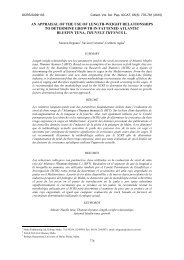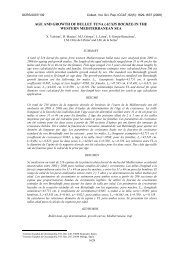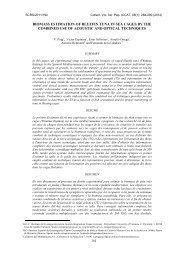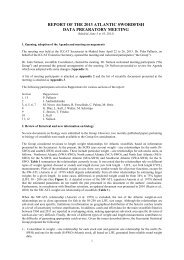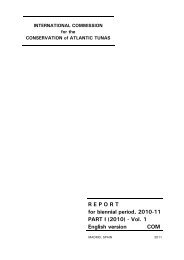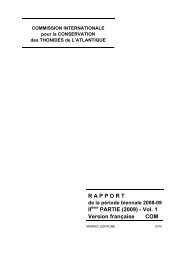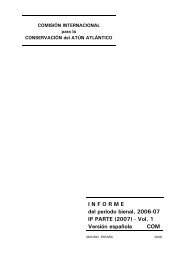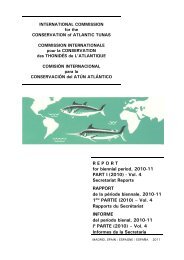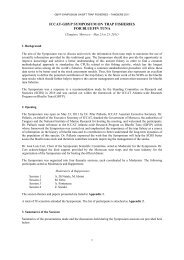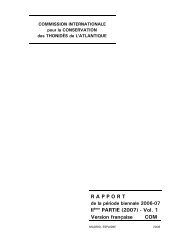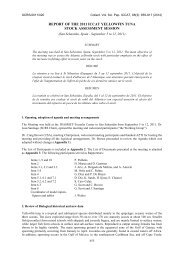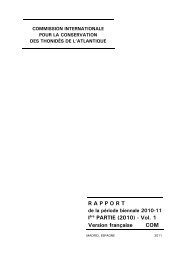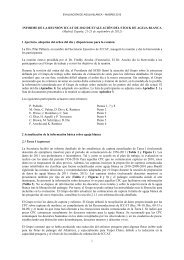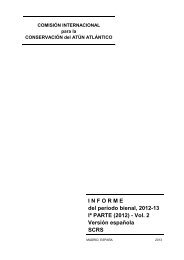E - Iccat
E - Iccat
E - Iccat
Create successful ePaper yourself
Turn your PDF publications into a flip-book with our unique Google optimized e-Paper software.
ICCAT REPORT 2002-2003 (II)<br />
3.5 OPENING STATEMENTS BY INTER-GOVERNMENTAL AND NON-GOVERNMENTAL ORGANI-<br />
ZATIONS TO THE PLENARY SESSIONS<br />
Food & Agriculture Organization of the United Nations (FAO)<br />
The Food and Agriculture Organization of the United Nations (FAO) is very grateful for the invitation extended<br />
by ICCAT´s Secretariat to observe the Eighteenth Regular Meeting of the Commission.<br />
FAO would also like to express heartfelt gratitude for the leading role of ICCAT during the Third Meeting of<br />
Regional Fishery Bodies held last March at FAO Headquarters. The meeting reviewed the decisions of the<br />
Twenty-fifth Session of COFI relating to regional fishery bodies affecting the management of fisheries and<br />
approaches to incorporate ecosystem consideration into fisheries management, etc., which many regional fishery<br />
bodies face in carrying out their work.<br />
FAO has been keeping a close and effective working relationship with ICCAT. The collaboration between the<br />
two organizations has been remarkably evolved recently, such as the collaboration in the field of fishery statistics<br />
in the framework of the Coordinating Working Party on Fishery Statistics (CWP), collaboration in the FIRMS-<br />
FIGIS project and collaboration between ICCAT and GFCM. FAO sent appropriate officers to the Sub-<br />
Committee on Statistics held in Madrid, 2-3 October 2003, and the Standing Committee on Research and<br />
Statistics (SCRS) also held in Madrid, 6-10 October 2003. It is FAO’s desire that such collaboration should be<br />
further enhanced.<br />
ICCAT is undoubtedly one of the leading organizations that are tackling the issue of IUU fishing. The efforts<br />
and experiences of ICCAT are providing valuable examples for other regions and nations to follow. FAO also<br />
wishes to strengthen its working relationship with ICCAT on this issue.<br />
I will carefully and conscientiously observe the proceedings of this meeting and report appropriately to the<br />
management of the FAO Fisheries Department.<br />
Taking this opportunity, FAO wishes to express again the appreciation for the assistance and cooperation<br />
received from ICCAT.<br />
Finally, I hope that the meeting will be marked with success and that the outcome will serve to promote<br />
sustainable and responsible tuna fisheries in the Atlantic Ocean.<br />
Thank you very much for the opportunity to make this statement on behalf of FAO.<br />
Caribbean Community (CARICOM)<br />
On behalf of the Member States of the Caribbean Community (CARICOM), I wish to thank the Commission for<br />
its invitation to participate in the 18 th Regular Meeting of the Commission. I also wish to acknowledge the efforts<br />
of the Government of Ireland to host this meeting. As in previous years, CARICOM looks forward to<br />
participating in all sessions open to observers.<br />
ICCAT trade sanctions: Regarding ICCAT trade sanctions currently affecting the CARICOM Member States of<br />
Belize and St. Vincent and the Grenadines, I am pleased to advise the Commission that significant progress has<br />
been made by these States to improve their cooperation with ICCAT at all levels. Firstly, both States have<br />
enacted into law the necessary legislation for controlling the activities of their fishing vessels on the high seas.<br />
This legislation provides for compliance with international fisheries conservation and management measures,<br />
and equips the States with the essential tools to investigate and penalize those persons and vessels found to be<br />
involved in illegal fishing activities.<br />
Secondly, and very importantly, neither Belize nor St. Vincent and the Grenadines has licensed vessels to harvest<br />
species currently regulated by an ICCAT quota.<br />
Thirdly, both States have introduced vessel monitoring systems, and are now fulfilling their statistical reporting<br />
commitments in accordance with ICCAT requirements. Moreover, there is also clear evidence of practiced<br />
management compliance by both States. Belize has investigated all reported instances of illegal fishing activities<br />
brought to its attention by ICCAT Contracting Parties, and has dealt with the vessels concerned, quickly and in<br />
70



